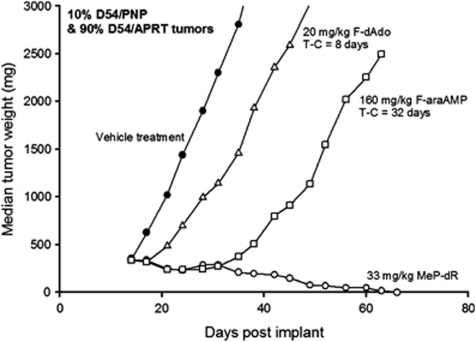Figure 5.
Effect of prodrugs on tumors that express E. coli PNP (purine nucleoside phosphorylase) in 10% of the cells and excess levels of human APRT (adenine phosphoribosyl transferase) in 90% of the cells. D54 tumor cells transduced with the human APRT gene were mixed with D54 tumor cells that had been transduced with the E. coli PNP gene, so that 10% of the mixture contained cells that expressed E. coli PNP and 90% of the cells expressed excess human APRT activity. This 90/10 mixture was injected subcutaneously into the flanks of nude mice. Drug treatment began on day 14 when tumors were approximately 300 mg. The activity of E. coli PNP and human APRT in the tumors at the time of treatment were 11 000±3600 units and 16 000±2400 units, respectively. In the 6-methylpurine-2′-deoxyriboside-treated mice on day 66 there were four complete regressions and two small persistent tumors (32 and 40 mg) that were not growing. The growth of tumors in mice treated with drugs was significantly different than that in vehicle-treated animals; P values⩽0.003 in all cases. The experiment has been repeated with similar results.

